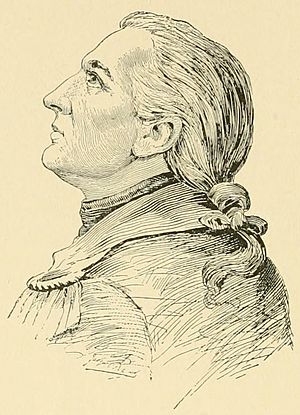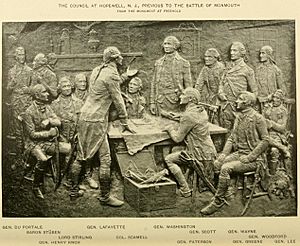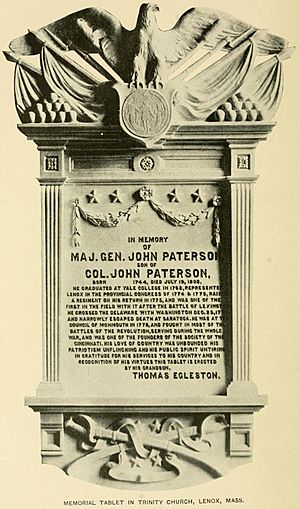John Paterson (New York politician) facts for kids
Quick facts for kids
John Paterson
|
|
|---|---|

Illustration depicting Paterson as shown on monument at Monmouth Battlefield State Park
|
|
| Member of the U.S. House of Representatives from New York's 16th district |
|
| In office March 4, 1803 – March 3, 1805 |
|
| Preceded by | District created |
| Succeeded by | Uri Tracy |
| Personal details | |
| Born |
John Paterson
1744 Farmington or New Britain, Connecticut Colony, British America |
| Died | July 19, 1808 (aged 63–64) Lisle, New York, U.S. |
| Resting place | Church on the Hill Cemetery Lenox, Massachusetts, U.S. |
| Political party | Democratic-Republican Party |
| Spouse |
Elizabeth Lee
(m. 1766; |
| Children | 7 |
| Parents | Major John Paterson (1708–1762) Ruth (Bird) Paterson |
| Education | |
| Profession |
|
| Military service | |
| Allegiance | |
| Branch/service | |
| Years of service | 1774–1775, 1786–1791 (Militia) 1775–1783 (Army) |
| Rank | Major General |
| Battles/wars | American Revolution |
John Paterson (1744 – July 19, 1808) was an important leader during the American Revolution. He became a major general in the Continental Army, which was the main army fighting for America's independence. Later, he served as a U.S. Congressman for New York State.
Contents
Early Life and Education
John Paterson was born in 1744 in the Connecticut Colony. His father, also named John Paterson, was a military veteran who fought in the French and Indian War. Sadly, his father passed away when John was young.
John Paterson went to Yale College and graduated in 1762. After college, he studied law and became a lawyer. He also worked as a justice of the peace in New Britain, Connecticut. This job meant he helped keep the peace and settled small legal issues.
In 1774, Paterson moved to Lenox, Massachusetts. There, he was chosen by the town to help manage local affairs. He also represented Lenox in the Massachusetts House of Representatives. This was a time when tensions were rising between the American colonies and Great Britain.
Fighting for American Freedom
When the American Revolution began in April 1775, John Paterson quickly joined the fight. He was made a colonel in the Massachusetts militia. He led his soldiers to the Siege of Boston, an early battle of the war. His unit also fought bravely at the Battle of Bunker Hill.
After the British left Boston, Paterson's regiment took part in the invasion of Canada. They also fought in important battles in New Jersey, like the Battle of Trenton and the Battle of Princeton. These victories were very important for the American cause.
In 1777, Paterson was promoted to brigadier general in the Continental Army. He led a group of soldiers during the Saratoga Campaign, which was a major turning point in the war.
Serving with George Washington
Paterson served directly under George Washington, the commander of the Continental Army. He fought at the Battle of Monmouth in 1778. For most of the rest of the war, he served in the Hudson Valley area of New York.
In September 1783, near the end of the war, he was promoted again to major general. He was one of the last generals to leave active duty after the war ended in December 1783.
The Story of Deborah Sampson
While serving in New York, General Paterson had a personal assistant named Robert Shirtliff. Later, it was discovered that "Robert Shirtliff" was actually a woman named Deborah Sampson. She had disguised herself as a man to join the army!
Instead of punishing her, General Paterson gave Deborah an honorable discharge. He also gave her a note of encouragement and money to help her travel home. This was a very kind and unusual act for the time.
After the war, Paterson helped create the Society of the Cincinnati. This was a group for officers who had served in the Continental Army.
Life After the War
After the American Revolution, John Paterson returned to Massachusetts. He continued his law practice and served in many local government roles. He was a town leader and helped manage local taxes and roads. He also helped make Lenox the main town for Berkshire County.
In 1786, he became a major general in the Massachusetts Militia again. He led militia units that helped stop Shays's Rebellion. This was an uprising by farmers who were unhappy about taxes and debts.
Moving to New York and Public Service
In 1790, John Paterson invested in a large piece of land in New York State. In 1791, he moved his family to Lisle, a new town in that area. He became a member of the New York State Assembly in 1793. The area where he lived is now part of Whitney Point.
Paterson also became a judge in New York. He served as a judge for Tioga County and later for Broome County.
In the early 1800s, Deborah Sampson, the woman who had served in the army disguised as a man, visited General Paterson. She was giving talks about her experiences. Her visit allowed her to meet other former soldiers who had settled in the area.
In 1802, John Paterson was elected to the United States House of Representatives. He served one term in Congress, from 1803 to 1805.
Death and Burial
John Paterson passed away in Lisle, New York, on July 19, 1808. He was first buried in Whitney Point. Later, in 1892, his remains were moved and reburied at Church on the Hill Cemetery in Lenox, Massachusetts.
Family Life
In 1766, John Paterson married Elizabeth Lee. They had seven children together:
- Josiah Lee (1766–1846)
- Hannah (1769–1803)
- Polly (1773–1790)
- Ruth (1774–1842)
- Betsey (1784–1784)
- John Pierce (1787–1842)
- Mariah (1790–1865)
Some of his grandsons, like Thomas J. Paterson and John E. Paterson, also became important politicians. His great-grandson, Thomas Egleston, was a well-known scientist.
 | Emma Amos |
 | Edward Mitchell Bannister |
 | Larry D. Alexander |
 | Ernie Barnes |



